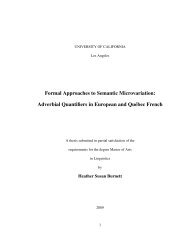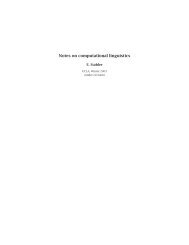Patterned Exceptions in Phonology - UCLA Department of Linguistics
Patterned Exceptions in Phonology - UCLA Department of Linguistics
Patterned Exceptions in Phonology - UCLA Department of Linguistics
Create successful ePaper yourself
Turn your PDF publications into a flip-book with our unique Google optimized e-Paper software.
any particular <strong>in</strong>put, but rather it constra<strong>in</strong>s the space <strong>of</strong> possible <strong>in</strong>puts and outputs <strong>in</strong> a<br />
probabilistic manner.” (p. 92) The mental system represented by the Stochastic<br />
Constra<strong>in</strong>t Model would have to exist alongside the system for mapp<strong>in</strong>g <strong>in</strong>puts to outputs.<br />
This dissertation proposes a model <strong>in</strong> which the same system that maps <strong>in</strong>puts to outputs<br />
can encode lexical regularities and patterns <strong>in</strong> the distribution <strong>of</strong> exceptions to those<br />
regularities.<br />
1.3. Preview <strong>of</strong> the proposal<br />
It is conceivable that knowledge <strong>of</strong> lexical regularities resides outside the grammar—or<br />
even that no discrete knowledge <strong>of</strong> the regularities exists at all. Speaker behavior that<br />
appears to reflect such knowledge could merely be the result <strong>of</strong> some on-l<strong>in</strong>e procedure<br />
such as consultation <strong>of</strong> a sample <strong>of</strong> the lexicon or match<strong>in</strong>g to associative memory. These<br />
two strategies are discussed at greater length <strong>in</strong> Chapter 6 and shown to be ill suited to<br />
the regularities discussed <strong>in</strong> this dissertation. As argued there, the speaker must possess<br />
knowledge that is abstracted away from the lexicon itself. The only l<strong>in</strong>guistic subsystem<br />
commonly proposed that conta<strong>in</strong>s such knowledge is the grammar. Therefore, the<br />
approach taken here will be to <strong>in</strong>corporate knowledge <strong>of</strong> lexical regularities directly <strong>in</strong>to<br />
the grammar.<br />
To accomplish that goal, this dissertation proposes a model <strong>of</strong> grammar that<br />
allows the primacy <strong>of</strong> listed <strong>in</strong>formation to coexist with knowledge <strong>of</strong> lexical regularities.<br />
Exist<strong>in</strong>g words’ behavior is encoded <strong>in</strong> their lexical entries; that <strong>in</strong>formation is preserved<br />
through high-rank<strong>in</strong>g faithfulness constra<strong>in</strong>ts and constra<strong>in</strong>ts that force listed <strong>in</strong>formation<br />
to be used if available. Lexical regularities are encoded through low- and variably ranked<br />
constra<strong>in</strong>ts, which are irrelevant for exist<strong>in</strong>g words, but determ<strong>in</strong>e the pronunciation <strong>of</strong><br />
novel words.<br />
9

















